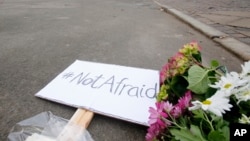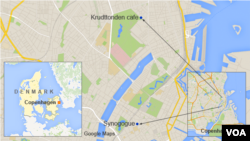Danish media are reporting that the gunman who attacked a free-speech seminar and a synagogue in Copenhagen was a former convict who had recently had been radicalized, perhaps while in prison.
Police have not released the shooter's name but the media have identified as Omar Abdel Hamid El-Hussein, who had been incarcerated for a vicious stabbing of a passenger in a train.
The sketchy details about the gunman emerged as tens of thousands of Danes gathered for vigils across the country. In Copenhagen, the prime minister and crown prince joined about 30,000 people honoring the victims in the bitter Monday evening cold outside the Krudttoenden cultural center.
Danish Prime Minister Helle Thorning-Schmidt said Monday there is "no indication" that the gunman who carried out deadly attacks in Copenhagen at a free-speech event and the city's main synagogue was part of a terrorist cell.
The Danish premier said the 22-year-old gunman was born in Denmark, and that police knew him "for several criminal acts" and gang connections. But she said investigators have not tied the suspect, who was shot dead by police, to an Islamic cell "that took him to where he was now."
Authorities have not named the gunman, but several news agencies in Denmark have identified him as Omar Abdel Hamid El-Hussein.
Danish intelligence chief Jens Madsen said investigators believe the gunman was inspired by Islamic radicalism, possibly including the terror attacks by Islamic extremists in Paris last month that killed 17 people.
Thorning-Schmidt called the two shootings a "cynical act of terror against Denmark." But she said the attack was "not a conflict between Islam and the West. This is not a conflict between Muslims and non-Muslims."
Rather, she said, "This is a conflict between the core values of our society and violent extremists."
Meanwhile, Danish police say they have arrested two men on suspicion of helping the gunman, by giving him "advice and assistance." A Copenhagen judge ordered the suspects held for 10 days while police continue their investigation.
Police killed the gunman early Sunday after he opened fire on officers near a train station.
In the first attack Saturday, a gunman with an automatic weapon killed one person and wounded three police officers at a cafe. Danish media identified the deceased as a 55-year-old film director, Finn Norgaard.
The synagogue attack
In Profile: Lars Vilks
In Profile: Lars Vilks
1946: Born in Sweden
2007: Cartoons of Prophet Muhammad as a dog published, placed under police protection; al-Qaida issues $100,000 bounty
2010: Seven Irish citizens arrested for plot to kill Vilks, attacked at Swedish college for showing film that depicts Prophet Muhammad entering a gay bar
2011: Three Swedes arrested for plot to kill Vilks
2013: al-Qaida in the Arabian Peninsula lists Vilks as one of its most wanted
2014: American nicknamed "Jihad Jane" sentenced to 10 years for plot to kill Vilks
2015: Attack at Copenhagen event organized by Vilks
The free-speech event was also attended by Swedish cartoonist Lars Vilks, who is known for provocative drawings, including a 2007 cartoon of the Prophet Muhammad that led to threats against the 68-year-old cartoonist. The French ambassador to Denmark, Francois Zimeray, also attended the discussion. Both were unharmed in the shooting.
Hours later, volunteer Dan Uzan was guarding a bar mitzvah ceremony when he was killed in the synagogue shooting, which wounded two police officers.
Netanyahu's call for immigration
In light of the violence, Israeli Prime Minister Benjamin Netanyahu urged Jewish people in Europe to immigrate to Israel, as he did following a deadly attack on a kosher supermarket in Paris last month.
But Thorning-Schmidt and other European leaders sought Monday to reassure Jews that they belong in Europe and are part of the continent's social and religious fabric.
French officials drew parallels between the acts of violence in Copenhagen and those in Paris.
Speaking from the Danish capital on Sunday, French Interior Minister Bernard Cazeneuve observed the similar reactions in both countries.
"I saw this morning the same sadness I saw in the terrified gaze of Parisians in the month of January [following Paris shootings]. The same sadness, the same fright, the same dignity, the same contemplation and the same sorrow," he said at a news conference.
The French ambassador to Denmark was expected to talk at the cafe Saturday about the impact of last month's attacks in France on the offices of the Charlie Hebdo satirical magazine and the kosher grocery. Those earlier attacks by Muslim extremists left 20 people dead, including three attackers. The French magazine was known for mocking religion and had published several cartoons depicting the Prophet Muhammad.
The targeted cartoonists
Threats and attacks against cartoonists whose work has angered some Muslims began with the publication of 12 editorial cartoons in the Danish newspaper Jyllands-Posten in September 2005. The paper said the cartoons, most of which depicted the Prophet Muhammad, were part of an attempt to contribute to the debate about criticism of Islam and self-censorship.
The cartoons eventually led to protests around the world, including violent demonstrations and riots in some Muslim countries.
Between October 2005 and early January 2006, examples of the cartoons were reprinted in major European newspapers from the Netherlands, Germany, Scandinavia, Romania and Switzerland. After major international protests, they were re-published around the globe, but primarily in continental Europe.
Many violent plots related to the cartoons have been discovered in the years since.
Artists other than cartoonists have also been the targets of Muslim ire for their work. British-Indian author Salman Rushdie's novel Satanic Verses led to death threats made against him, including a fatwa calling for his assassination issued by Ayatollah Ruhollah Khomeini, the Supreme Leader of Iran, in 1989.
Dutch filmmaker Theo Van Gogh was killed in November 2004 by a Dutch-Moroccan Muslim angered by Van Gogh's short film Submission, which criticized the treatment of women in Islam.






